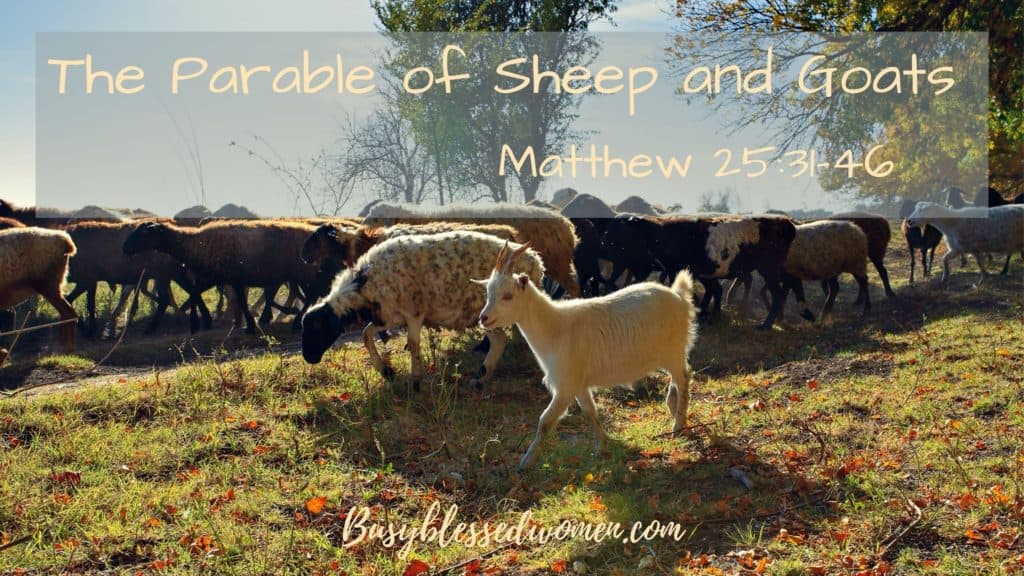The Parable of Sheep and Goats is the last recorded parable in Matthew’s Gospel. From there, he goes immediately into Passion Week. It seems fitting then that this teaching was on the Judgement of the Nations and the Kingdom of God. As Jesus was preparing to leave, He was also preparing them for His return.

The Parable of the Sheep and Goats Meaning
We find Jesus’s Parable of Sheep and Goats in Matthew 25:31-46.
Jesus uses this parable to describe the consequences of being an obedient follower versus a pretender or unbeliever. Let’s break it down…
“When the Son of Man comes in His glory, and all the holy angels with Him, then He will sit on the throne of His glory.” Matthew 25:31NKJV.
This verse is a description of when Jesus Himself, our divine King and Judge, returns to earth. He will be here and on His throne!
This is but one of many judgments God exercises. We have already seen the judgment on Adam and Eve, the flood of Noah’s time, the destruction of Sodom and Gomorrah, and the plagues against Egypt, just to name a few. The judgement described here is not the final judgment; others follow.
The Judgement of the Nations
“All the nations will be gathered before him, and he will separate the people one from another as a shepherd separates the sheep from the goats.” v32.
This wasn’t a blanket judgement of groups of people, but individual- He separates “one from another.”
Jesus’ use of sheep and goats was appropriate because this was a concept the people would understand.
Shepherds often herded sheep and goats together. They grazed together during the day, but the goats didn’t tolerate the cooler night air.
It didn’t bother the sheep, so the shepherd separates sheep from goats and herded the goats together for warmth. The separation of the sheep and goats also happened when the time came for shearing the sheep.
Sheep and Goats Difference
Jesus spoke of Himself as our Good Shepherd, and those who followed Him, His righteous sheep. Sheep aren’t famous for their sense of direction. If one runs off in a different direction, others instinctively follow. But they recognize and know their shepherd’s voice.
Sheep don’t have many defenses except for possibly a good swift kick and running as a pack. Like the sheep, God’s people need the direction, protection, and the voice of our Shepherd to guide us.
However, goats exhibit independence, headstrongness, and stubbornness. Perhaps these characteristics and their destructive tendencies are why they are compared to unbelievers. They are an appropriate contrast to the description of sheep.
Separate the Sheep from the Goats
“And He will set the sheep on his right hand and the goats on his left. Then the King will say to those on his right hand, ‘Come, you blessed of my Father; inherit the kingdom prepared for you from the foundation of the world.’” vv33-34. NKJV.
The King places the sheep at His right hand, a place of honor and blessing. Their acceptance of salvation rewards them with a place in the kingdom of heaven. He continues with the reasoning:
“For I was hungry, and you gave me something to eat, I was thirsty, and you gave me something to drink, I was a stranger and you invited me in, I needed clothes and you clothed me, I was sick, and you looked after me, I was in prison and you came to visit me.” vv35-36.
While there is no mention of faith here, we know Scripture is absolutely firm, there is nothing we can do to earn our salvation. It is only by faith, through God’s grace and mercy, that we can stand before Him, righteous and pure.
Our choices to perform good works show the effect our salvation had on our hearts. We grow more like Christ and mirror the fruit of the Spirit.
The Least of These
I had never really noticed that the King surprised the “sheep” when He was naming off their good works in His name-
“Then the righteous will answer him, ‘Lord, when did we see you hungry and feed you, or thirsty and give you something to drink: When did we see you a stranger and invite you in, or needing clothes and clothe you? When did we see you sick or in prison and go to visit you?’” vv37-39.
Jesus then tells them plainly, “I tell you the truth, whatever you did for one of the least of these brothers of mine, you did for me.” v40.
His reasoning surprised them because they had not performed these acts of kindness and mercy to gain a reward. Their heart’s nature and compassion was to care for others in need.
True followers of Jesus show loving compassion to “the least of these.”
Who are the Goats in the Bible?
The King then turns His attention to the goats on His left hand-
“Depart from me, you who are cursed, into the eternal fire prepared for the devil and his angels.” v41.
Notice how Jesus describes this everlasting punishment. It was prepared for the devil and his angels. He didn’t prepare it for man; they only end up there because they purposely refuse Jesus and His sacrifice.
Jesus explains to them the same message from the negative viewpoint:
“For I was hungry, and you gave me nothing to eat, I was thirsty, and you gave me nothing to drink, I was a stranger, and you did not invite me in, I needed clothes and you did not clothe me, I was sick and in prison and you did not look after me.” vv42,43.
The “goats” also expressed surprise as the sheep did, but apparently His first explanation did not hit home. So, he repeats it in the negative:
“I tell you the truth, whatever you did not do for one of the least of these, you did not do for me.” v45.
He condemns the goats for the lack of good fruit in their lives. They saw the needy and believed it was someone else’s job to care for them. Or maybe they were too busy, or stingy with their God-given resources, or just turned a blind eye to the hurting.

Kindness and Compassion
This parable describes many acts of mercy and kindness that we can do every day. We don’t have to be rich, insanely smart, or possess any special abilities to perform good deeds. They are all simple things which we will see if our eyes and hearts are open to them.
Jesus clarifies that helping anyone, no matter their status, is the same as helping Him, and a duty for all followers of Christ.
Likewise, when we do not help the ones in need, it is the same as not helping Jesus.
When Jesus met Saul on the road to Damascus, He asked him, “Saul, Saul, why do you persecute me?” (Acts 9:4)
Saul, by his active and murderous opposition to Christians, was also persecuting Jesus.
Our salvation should cause a heart transformation that prioritizes serving Jesus by helping others.
Why is the Parable of the Sheep and Goats Important?
The parable ends with these sobering words from the King:
“Then they will go away to eternal punishment, but the righteous to eternal life.” v46.
Jesus’ teaching is warning us about the perils of unbelief. He wants no one to suffer an eternity of punishment. We recently studied about the wide gate and broad road that leads to destruction.
The story of the sheep and goats answers the question of which road you are traveling.
Lessons from the Parable of the Sheep and Goats
•We don’t earn our salvation by visiting those in prison, feeding the hungry, etc. You could do these things without having an inner motive of love and kindness.
Acts of compassionate service to God’s hurting people show our changed heart. We love Jesus and how we treat others reflects that love.
•No service is too small. Did you notice Jesus mentions something as simple as giving a thirsty person a drink of water? Any act of kindness performed as if it was to Jesus Himself reveals our heart status.
•Becoming more like Jesus is not just a lifestyle of forgoing our favorite sins. When we see the interaction between Jesus and the goats, we realize He has seen those opportunities we passed by or neglected, as well as the kind things we do. Make every effort to do the good you can.
•This parable is not about actual sheep and goats, because we base their behavior on instinct. Jesus uses the differences in their natures to show us He sees our behavior and judges the motives of our hearts. Loyal and true followers have an ever-growing capacity for sacrificial love.
•Jesus’s sheep follow the example of their compassionate, unselfish, and loving Good Shepherd. We can ask Him to give us His deep love for others. When we love people, we love Him also!
•Our choices always matter. Our choices reveal to Whom we belong and serve.
The Sheep and Goats Summary
These words from John express the truth of this parable beautifully:
“We know that we have passed from death to life because we love our brothers. Anyone who does not love remains in death. This is how we know what love is: Jesus Christ laid down his life for us. And we ought to lay down our lives for our brothers. If anyone has material possessions and sees his brother in need but has no pity on him, how can the love of God be in him?” 1 John 3:14,16-17.
What we do for others matters and shows how we really feel about Jesus’ commands to His followers. We all need to ask ourselves how our actions separate us from unbelievers.
How does your love for others reflect your love for Him?
Blessings,
AnnMarie
All Scripture is taken from the NIV unless specified otherwise.
Photo Credit- Deposit Photos, Canva
